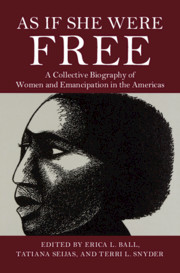Book contents
- As If She Were Free
- As If She Were Free
- Copyright page
- Dedication
- Contents
- Figures
- Contributors
- Elizabeth Catlett and the Form of Emancipation
- Acknowledgments
- Introduction
- Part I Claiming Emancipation during the Rise of New World Slavery
- Part II Experiencing Freedom during Slavery’s Expansion
- 7 Judith and Hannah: Eighteenth-Century Florida, South Carolina, and Virginia (US)
- 8 Sarah Chauqum, Eighteenth-Century Rhode Island and Connecticut (US)
- 9 Marion, Eighteenth-Century Natchitoches, Louisiana (US)
- 10 Anna Maria Lopes de Brito, Eighteenth-Century Minas Gerais (Brazil)
- 11 Juana Ramírez, Eighteenth-Century Oaxaca, New Spain (Mexico)
- 12 Juana María Álvarez, Eighteenth-Century New Granada (Colombia)
- 13 María Hipólita Lozano, Eighteenth-Century Lima (Peru)
- Part III Envisaging Emancipation during Second Slavery
- Part IV Enacting Emancipation in the Aftermath of Slavery
- Bibliography
- Index
12 - Juana María Álvarez, Eighteenth-Century New Granada (Colombia)
from Part II - Experiencing Freedom during Slavery’s Expansion
Published online by Cambridge University Press: 24 September 2020
- As If She Were Free
- As If She Were Free
- Copyright page
- Dedication
- Contents
- Figures
- Contributors
- Elizabeth Catlett and the Form of Emancipation
- Acknowledgments
- Introduction
- Part I Claiming Emancipation during the Rise of New World Slavery
- Part II Experiencing Freedom during Slavery’s Expansion
- 7 Judith and Hannah: Eighteenth-Century Florida, South Carolina, and Virginia (US)
- 8 Sarah Chauqum, Eighteenth-Century Rhode Island and Connecticut (US)
- 9 Marion, Eighteenth-Century Natchitoches, Louisiana (US)
- 10 Anna Maria Lopes de Brito, Eighteenth-Century Minas Gerais (Brazil)
- 11 Juana Ramírez, Eighteenth-Century Oaxaca, New Spain (Mexico)
- 12 Juana María Álvarez, Eighteenth-Century New Granada (Colombia)
- 13 María Hipólita Lozano, Eighteenth-Century Lima (Peru)
- Part III Envisaging Emancipation during Second Slavery
- Part IV Enacting Emancipation in the Aftermath of Slavery
- Bibliography
- Index
Summary
One of the few avenues for women to achieve freedom from slavery in the Kingdom of New Granada was to be manumitted by slaveholders. Only ten percent of the enslaved population in New Granada’s central region (state of Cundinamarca) gained their liberty through this legal action. Eufemia Álvarez was part of that small group, as her master Don Juan Álvarez voluntarily manumitted her in the mid eighteenth century. Consequently, her daughter Juana María Álvarez was born in freedom, even if both of them remained servants in Don Juan Álvarez’s household in Guaduas—a rural town that was part of the Royal Road from Honda to Santa Fe. In 1758, Juana María suffered re-enslavement when she was sold and taken to Quito, away from her family. Juana María resorted to the appellate court in Honda to re-claim her freedom and petition for her own protection as well as her daughter’s. Juana María’s biography emerges from legal documents, which record her struggle—and ultimately, her failure—to legitimate her freedom, despite having been voluntarily manumitted by the original slaveholder. Read against the grain, her life serves as a critique of a legal system that failed to protect freed women.
Keywords
- Type
- Chapter
- Information
- As If She Were FreeA Collective Biography of Women and Emancipation in the Americas, pp. 218 - 235Publisher: Cambridge University PressPrint publication year: 2020



